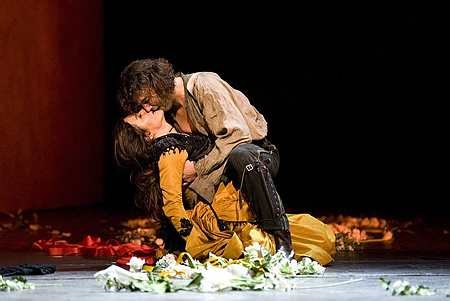|
|
|
|
|
|
|
|
| The Spectator, 16 December
2006 |
| by Michael Tanner |
Bizét: Carmen, Royal Opera House, London, December 2006
|
Carmen Royal Opera House
|
|
 The Royal Opera’s new production of Carmen — and
about time, too — has as its heroine a singer we are much more used to in
baroque or bel canto operas, the determined-not-to-be-pigeonholed Anna
Caterina Antonacci. Vocally, she is restrained to the point of sometimes
seeming underpowered, but she shows she can deliver the goods in the final
scene. Her acting is traditional hip swinging, with a fair amount of
audacious skirt lifting and wide-apart-legs provocation. It’s a decent
performance, but not a striking or memorable one. In that it’s in the
strongest contrast to the Don José of Jonas Kaufmann, which is in all
respects on a level that puts the rest of the production in the shade. He is
not at all a stage-hogger, it’s just that he has a magnificent tenor voice,
the finest heard at Covent Garden for quite some time, and is a gifted,
intuitive actor who conveys a strong sense of humanity; in that he is like
his great teacher Hans Hotter. Don José is very difficult to make a
plausible, coherent character of: indecisive, with a self-confessed history
of violence, it’s not easy to see why someone as tough as Carmen would look
at him twice. He can be interpreted as a psychotic, which is how Jon
Vickers, the finest José I have seen before Kaufmann, read him, with a voice
to match. Kaufmann makes him as dignified as possible, but uncomprehending
of so extravagant a phenomenon as Carmen, so that he virtually achieves
tragic dimensions. In the final scene he is so harrowing that even after an
evening of impertinent applause, beginning halfway through the Prelude, I
was still shocked at how soon the cheering began. The Royal Opera’s new production of Carmen — and
about time, too — has as its heroine a singer we are much more used to in
baroque or bel canto operas, the determined-not-to-be-pigeonholed Anna
Caterina Antonacci. Vocally, she is restrained to the point of sometimes
seeming underpowered, but she shows she can deliver the goods in the final
scene. Her acting is traditional hip swinging, with a fair amount of
audacious skirt lifting and wide-apart-legs provocation. It’s a decent
performance, but not a striking or memorable one. In that it’s in the
strongest contrast to the Don José of Jonas Kaufmann, which is in all
respects on a level that puts the rest of the production in the shade. He is
not at all a stage-hogger, it’s just that he has a magnificent tenor voice,
the finest heard at Covent Garden for quite some time, and is a gifted,
intuitive actor who conveys a strong sense of humanity; in that he is like
his great teacher Hans Hotter. Don José is very difficult to make a
plausible, coherent character of: indecisive, with a self-confessed history
of violence, it’s not easy to see why someone as tough as Carmen would look
at him twice. He can be interpreted as a psychotic, which is how Jon
Vickers, the finest José I have seen before Kaufmann, read him, with a voice
to match. Kaufmann makes him as dignified as possible, but uncomprehending
of so extravagant a phenomenon as Carmen, so that he virtually achieves
tragic dimensions. In the final scene he is so harrowing that even after an
evening of impertinent applause, beginning halfway through the Prelude, I
was still shocked at how soon the cheering began.
In the thankless role of Micaela, Norah Amsellem, on the second evening of
the run, sang adequately but flapped her arms to no purpose; while
Ildebrando D’Arcangelo’s Escamillo is so ill-mannered as to appear in Lillas
Pastia’s tavern riding his horse. Though subtlety would be out of place in
performing the role, D’Arcangelo is crude. The supporting cast is strong,
with a specially impressive Zuniga from Matthew Rose, who makes a bigger
mark with each role he sings. Antonio Pappano conducts with his usual acute
ear for unusual and telling detail. The work is produced, or rather
unproduced, by Francesca Zambello. Lots of people on stage, especially
children, none of them doing anything; the principals left, so far as one
could tell, to fend for themselves; not one enlivening touch, all told what
nearly amounted to sabotage. Fortunately Carmen, unlike its heroine, is
indestructible. |
|
|
|
|
|
|
|
|
|
|
|
|
|
|
|
|
|
|